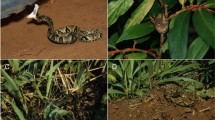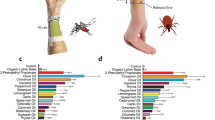Abstract
WHEN an insect is reared at graded temperatures, it is commonly found that the size of the resultant offspring decreases with increasing temperature1. Evidence of the working of this principle in Nature has emerged in a study of the competition amongst the various organisms which scour and keep open the bacteria beds of sewage works1. Four species of these nematocerous Diptera have been systematically measured for eighteen months, the wing-length of the female being taken as a convenient criterion of size. The flies were trapped on the beds of Leeds and of Huddersfield sewage works, where the monthly mean bed temperatures have a range of about 7°–18° C. They were sorted into monthly groups and the standard sample measured varied from 50 to 200 from each of several trapping sites.
This is a preview of subscription content, access via your institution
Access options
Subscribe to this journal
Receive 51 print issues and online access
$199.00 per year
only $3.90 per issue
Buy this article
- Purchase on Springer Link
- Instant access to full article PDF
Prices may be subject to local taxes which are calculated during checkout
Similar content being viewed by others
References
Uvarov, B. P., Trans. Ent. Soc. Lond., 79, 38 (1931).
Lloyd, Ll., Proc. Roy. Ent. Soc. Lond., 10, 34 (1935); J. Inst. Sewage Purification, Part 1 (1937).
Author information
Authors and Affiliations
Rights and permissions
About this article
Cite this article
GOLIGHTLY, W., LLOYD, L. Insect Size and Temperature. Nature 144, 155–156 (1939). https://doi.org/10.1038/144155b0
Issue Date:
DOI: https://doi.org/10.1038/144155b0
This article is cited by
-
10.1007/BF00291059
CrossRef Listing of Deleted DOIs (2011)
Comments
By submitting a comment you agree to abide by our Terms and Community Guidelines. If you find something abusive or that does not comply with our terms or guidelines please flag it as inappropriate.



